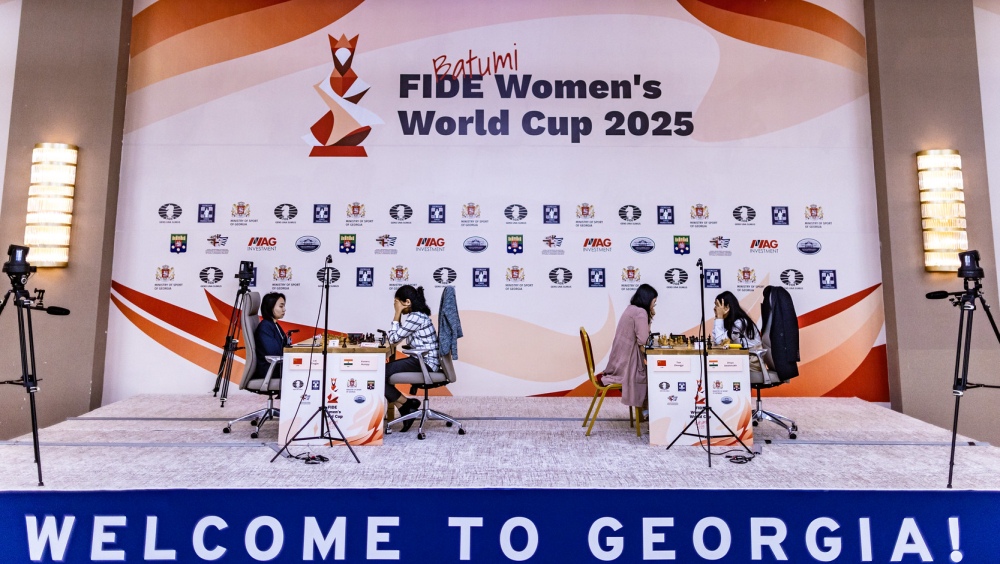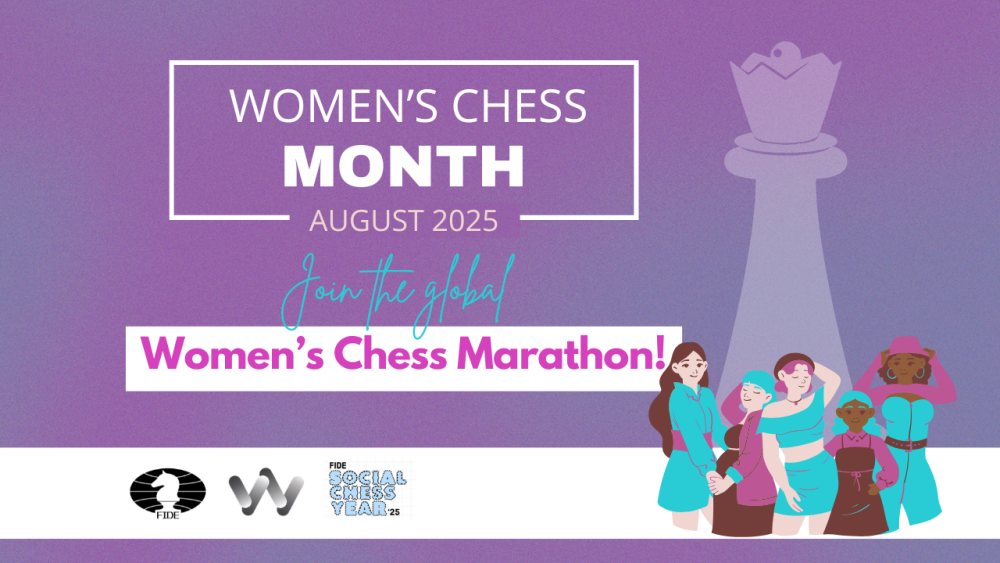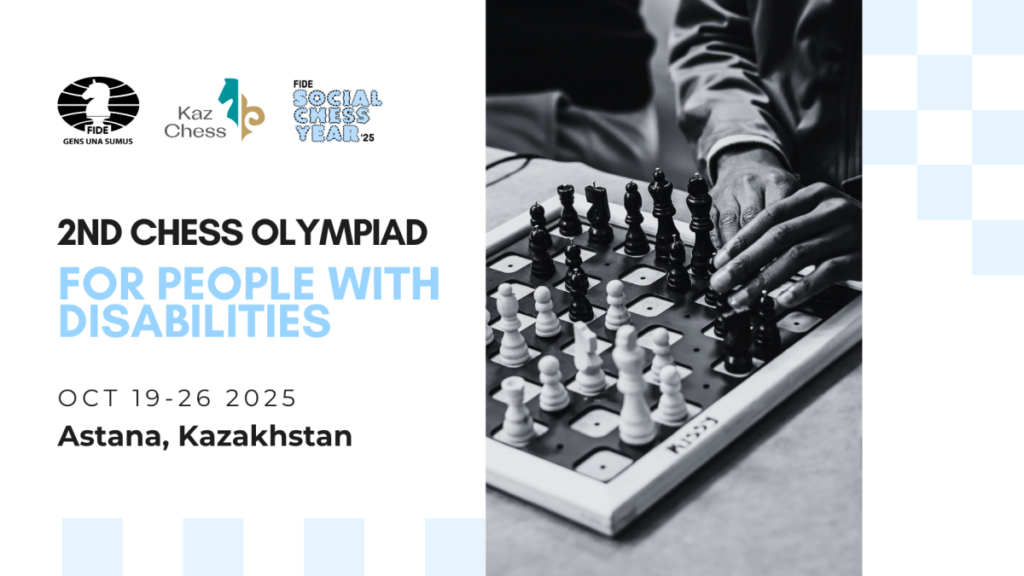FIDE Women’s World Cup Round 6 Game 1: Two solid draws in the semi-finals

The stage is set for a thrilling showdown between China and India in the Women’s World Cup semi-finals. This afternoon, the first games of the two-game matches were played — and both encounters ended in hard-fought draws, leaving everything to be decided in tomorrow’s second games. Humpy Koneru surprised Lei Tingjie in the opening, prompting the Chinese Grandmaster to steer the game toward safer territory. It was a tense, strategic battle with both players feeling the pressure. “It was quite a tough game, not easy at all,” said Humpy in her post-game interview. “At some points I felt I was OK, but then I thought it was a bit dubious. I really don’t know what was going on.” A quieter affair on board two saw a relatively short and balanced game between the experienced Tan Zhongyi and India’s rising star, Divya Deshmukh. “I don’t have many thoughts on the game, as it was quite a short draw,” Divya remarked afterward. “I don’t think I was much worse at any point, but it could have definitely been slightly unpleasant if she had chosen the right ending.” Let’s take a closer look at the two games. Lei Tingjie vs Humpy Koneru (0.5-0.5) Lei opened with her usual 1.e4, but then spent ten minutes of her thinking time after Humpy’s fourth move. For the Indian GM, balancing new openings with her regular repertoire is not a problem. As Humpy explained after the game: “It’s quite standard to bring new openings to a tournament to have some new ideas. The Berlin Defence is quite a standard opening that has been played for many years.” After 1.e4 e5 2.Nf3 Nc6 3.Bb5 Nf6 4.O-O Humpy played 4…Ne7, an interesting alternative to the more popular 4…Bc5 and 4…d6. This line aims to reposition the knight via g6, reinforcing kingside control and avoiding early exchanges. Notably, 5.Nxe5 would be a serious mistake—Black responds with 5…c6, hitting the bishop, followed by 6…Qa5+, with a double attack on the king and the knight. Lei spotted the trap immediately but fell deep into thought on how to proceed, as there are many interesting possibilities. “I tried to sacrifice a pawn for piece play, but my opponent declined both times,” Humpy explained. Going into the middlegame, Lei had achieved a small edge based on slightly superior piece activity. On the clock, the situation was alarmingly equal — approximately half an hour left for each of them on move eighteen. But Humpy gradually neutralized Lei’s small initiative and even found chances of her own. “After I got in this …a6, …c4 and …Bc5 plan I think the position is quite comfortable for me,” Humpy explained after the game. The final interesting moment would have occurred if Humpy had captured a pawn that was up for grabs. Although the engine confirms that 35…Qxa4 is perfectly playable, Humpy didn’t like the idea of facing a direct attack after 36.f6!, which would have broken open the kingside around her castled king. “I didn’t like capturing that pawn at all, either directly or with a preparatory move. I just didn’t like that kind of position. My pieces are out of the game, and I preferred to keep things in control,” she explained. Her intuition, as it turns out, was spot on. Humpy played very sensible 35…Qd3 and a few moves down the road, the game was drawn. https://youtu.be/GoKTSeX_vUk Tan Zhongyi vs Divya Deshmukh (0.5-0.5) Against her opponent’s Queen’s Gambit Declined, Tan Zhongyi opted for an unexpected idea on move four—4.e3 instead of the more popular 4.Nc3 or 4.Bg5—forcing Divya to pause and think deeply. Checking recent games, I found that Tan had used this line before, notably against Hou Yifan and Ju Wenjun, suggesting it’s a quiet but deliberate part of her repertoire. “I didn’t expect 4.e3, so I took a few minutes to decide which variation I should go for,” Divya explained after the game. After careful consideration, she chose to steer the game into an isolated queen’s pawn (IQP) structure—an excellent strategic decision in response to Tan’s more restrained setup. In doing so, she followed in the footsteps of her compatriot, GM Vidit Gujrathi, who successfully employed the same approach in a 2021 encounter. On move eleven, Divya unveiled an impressive novelty: 11…Ba3!, an improvement over the more commonly played 11…Bb4+, seen in several master-level games. While 11… Bb4+ is also perfectly reasonable, 11…Ba3! had a surprising point. After 12.Bxa3 Qa5+, Divya immediately recovered the bishop, reaching full equality. Her isolated d-pawn was offset by active piece play — especially her queen on a3 — and pressure along the open files. In the following phase, after a series of exchanges and the liquidation of queenside pawns, the opponents simplified into a completely equal ending. A draw was agreed upon on move thirty. After the game, Divya took a few moments to share her thoughts in a short interview. https://www.youtube.com/watch?v=ChFDvDIDNhA Written by IM Michael Rahal (Batumi, Georgia) Photos: Anna Shtourman About the tournament: Scheduled to take place from July 6th to July 28th, the 2025 FIDE Women’s World Cup will gather together in Batumi (Georgia) the world’s best female chess players. A total of 107 players from 46 different federations are set to participate in the event, including seventeen of the current top twenty! Chess legends, seasoned professionals and emerging talents will play for the $50,000 first prize, in addition to three qualifying spots for the Candidates. The full pairings tree and day-by-day results can be found on the Women’s World Cup website.
August is for Women in Chess: Join the Global Women’s Chess Marathon

As part of FIDE’s 2025 Year of Social Chess, each month is dedicated to celebrating how chess can make a positive impact in society. This August, we shine the spotlight on Women in Chess — a month-long global celebration aimed at empowering women and girls through the game we all love. The FIDE Commission for Women’s Chess (WOM) is proud to lead this initiative and coordinate a variety of inspiring events around the world, including the Women’s Chess Marathon, highlighting the role of women in the chess community and encouraging inclusive participation across all levels. A Global Effort: Events Already Planned With the support of WOM, a vibrant lineup of events is already scheduled in 2 countries of each continent — Africa, America, Europe, Asia: Portugal Italy Australia Nepal South Africa Zambia Puerto Rico Venezuela These activities will range from tournaments and training sessions to workshops, exhibitions, and community outreach — all focused on engaging more girls and women in the chess world. Also, with support of ARB, WOM organize first ever only Women International Arbiter Seminar: Special Edition of the IA Seminar for WOMEN only – List of Participants! The Registration is closed! – Arbiters’ Commission Introducing the Women’s Chess Marathon August won’t just be about individual events — it will be a global marathon of efforts, stories, and celebrations. We’re calling it the Women’s Chess Marathon, and we want you to be a part of it! No matter where you are in the world, you can join the movement by organizing an event or activity for women and girls in chess during August. It can be as big as a tournament or as simple as a chess meetup, a school activity, or an online workshop. Every effort counts. Organizers — We Need You! Are you a chess club, federation, coach, teacher, or community leader? We invite you to: Plan a chess event that welcomes and empowers girls and women Highlight female role models in your community Create safe, inclusive spaces where more women and girls can thrive through chess Share your stories on social media using the hashtags #WomensChessMarathon and #WomenInChess, and tag @fidewomen on Instagram so we can amplify your efforts We’ll be sharing your initiatives on our platforms throughout August, celebrating the incredible work being done around the globe. Let’s Make August Unforgettable Let’s work together to make August a month that truly reflects the presence and passion of women and girls in chess. The Women’s Chess Marathon isn’t necessarily about big campaigns. It’s about real people, real events, and real effort — from small local meetups to international tournaments. Every activity matters. If you’re helping more girls and women feel welcome in chess, you’re part of this. We can’t wait to see what you create. Let’s make it a month to remember — together. For questions, support, or to share your planned activities with us directly, email to our coordinator: anna.kantane@gmail.com
2nd FIDE Chess Olympiad for People with Disabilities set for October 2025 in Astana

FIDE is proud to announce that the 2nd Chess Olympiad for People with Disabilities will take place from October 19 to 26, 2025, in Astana, Kazakhstan. Organized by FIDE and hosted by the Kazakhstan Chess Federation, this major international event underscores FIDE’s ongoing commitment to inclusion and accessibility in the global chess community. The Olympiad will bring together up to 34 teams from across the world, composed of players with visual, hearing, and physical impairments. Each team will consist of four players (with at least one from each gender), one captain/reserve, and one accompanying person. The competition will be held at the Paralympic Training Centre in Astana, a venue specially adapted to accommodate the needs of all participants. “We are proud that our capital will host such a significant event, where each participant can showcase their intellect, resilience, and passion for chess. This Olympiad is more than just a competition; it is a powerful symbol of inclusion, equal opportunity, and respect for every individual. For us, it is also an important marker that Kazakhstan and Kazakhstan Chess Federation are consistently working to create an environment where everyone has the chance to realize their full potential. We are confident that the tournament will leave a lasting impression on all participants and guests – and we, in turn, will do our best to ensure its successful and meaningful execution. We are also deeply grateful to the Mayor of Astana, Zhenis Kassymbek, for his invaluable support of this tournament,” — Timur Turlov, President of the Kazakhstan Chess Federation “The Chess Olympiad for People with Disabilities is a celebration of human potential and the spirit of competition. We are deeply grateful to the Kazakhstan Chess Federation for their dedication and hospitality. Their efforts will help us deliver an unforgettable experience for all participants. As 2025 marks the Year of Social Chess in FIDE, this event perfectly embodies our mission to promote chess as a game for everyone, regardless of physical ability,” — Arkady Dvorkovich, FIDE President The competition will follow a 6-round Swiss system, with games played under classical time control. In addition to team medals and trophies, individual board prizes and special awards—including recognitions for youngest and oldest players in various categories—will be presented. The first edition of the Chess Olympiad for People with Disabilities was held in Belgrade, Serbia, in 2023, and marked a historic milestone for accessible chess events. It attracted global attention for its inclusive spirit and high-level organization, setting the stage for a growing tradition. 2nd FIDE Chess Olympiad for People with Disabilities Regulations (PDF) For registration and queries, federations are encouraged to contact: dis@fide.com.

